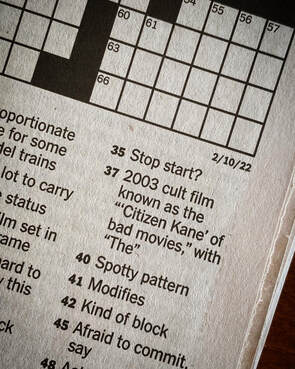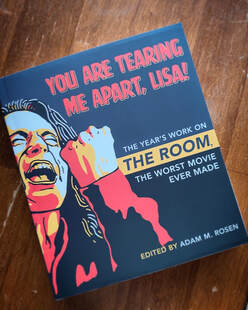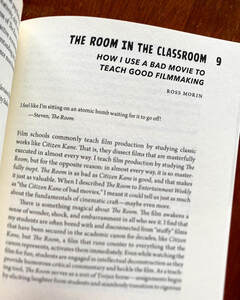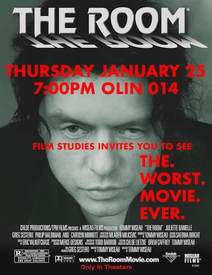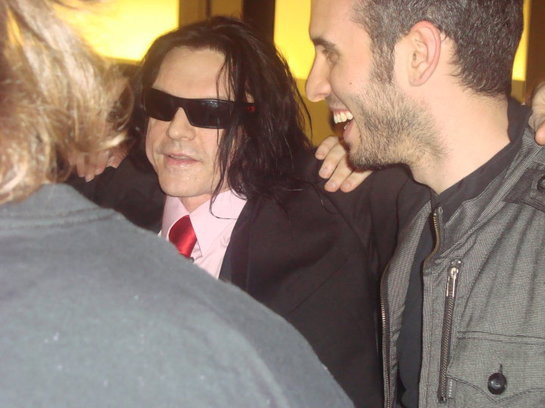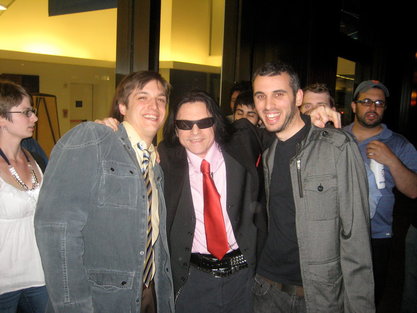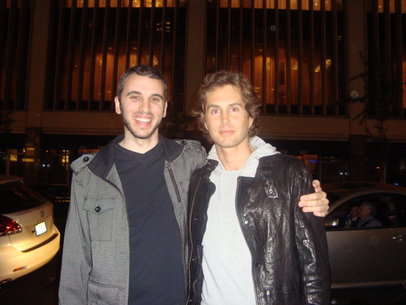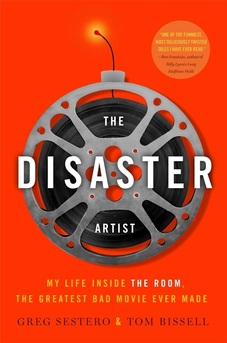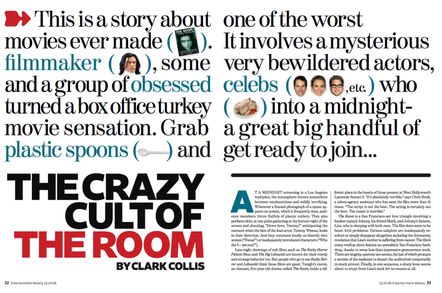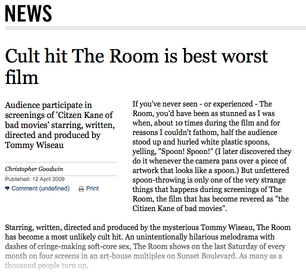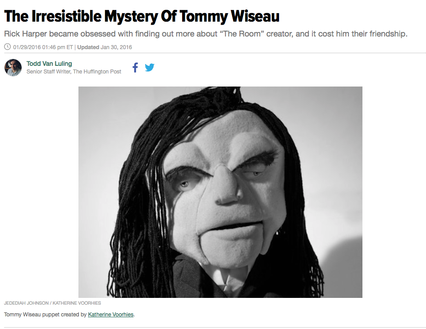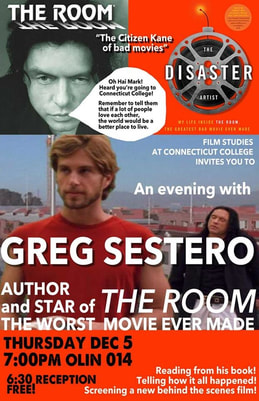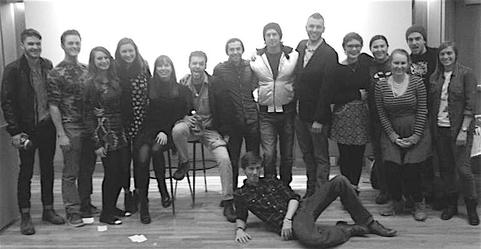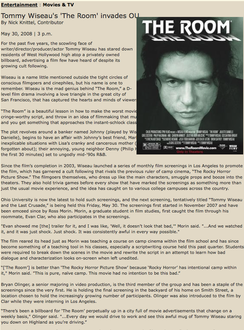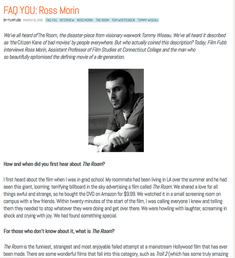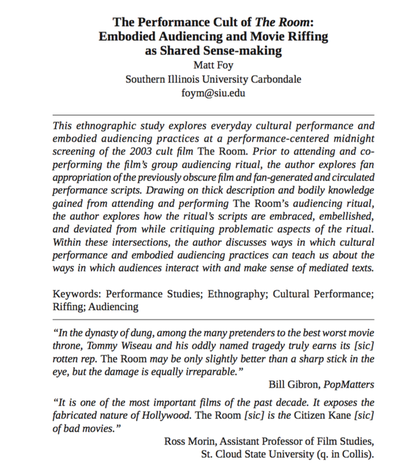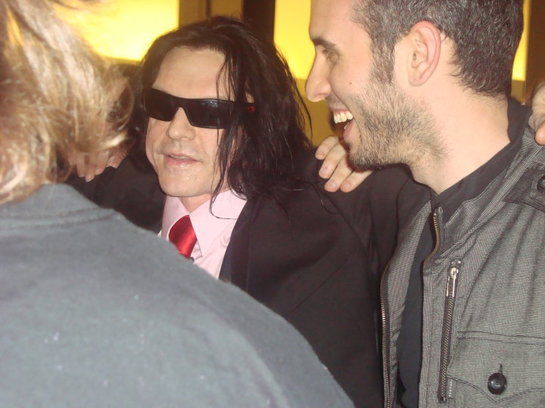"THE CITIZEN KANE OF BAD MOVIES"
|
In an interview with Entertainment Weekly, I called THE ROOM, "The Citizen Kane of bad movies." It's not the most interesting thing I've ever said, but, heck, it stuck. And now, despite being an award winning filmmaker and teacher, the thing I'm best known for is the most famous quote about the most important bad film of all time -- and I'll take it! The Room is my favorite film. Period. Because it is such a terrible film, it's an invaluable teaching tool. I use The Room to teach screenwriting, cinematography, blocking, sound design, and, of course, feminist film theory. I event have a chapter about it in the first academic book on The Room where I discuss how I use a bad movie how to teach good filmmaking.
I've created this page to post some of my thoughts on The Room and to share some of ways that my quote has made it into pop culture. Some of my thoughts were captured in an interview here https://www.theday.com/movies--tv/20180112/the-citizen-kane-of-bad-movies-credit-conn-prof-ross-morin-with-that-classic-quote-about-x2018the-roomx2019 |
At the Ziegfeld Theater in NYC - the first time I met Tommy and Greg. That happiness cannot be faked.
|
THE DISASTER ARTIST by Greg Sestero (Mark) and Tom Bissel is an astonishing read. I'd never thrown a book to the floor because I was laughing so hard before. The hardcover jacket and website reference "The Citizen Kane of bad movies." The fanboy in me is overjoyed to be connected to The Room and The Disaster Artist - two things that bring me ultimate joy. |
|
ENTERTAINMENT WEEKLY
contacted me in fall 2008 for an interview in an article called The Crazy Cult of The Room. Here's the original quote: “It is one of the most important films of the past decade,” says Ross Morin, an assistant professor of film studies at St. Cloud State University in Minnesota. “It exposes the fabricated nature of hollywood. The Room is the Citizen Kane of bad movies.” Clark Collis' article propelled The Room into global fame. I'm so fortunate that he included a few words of mine. |
|
THE SUNDAY TIMES OF LONDON
reached out to me soon thereafter in their article Cult Hit The Room is Best Worst Film. From the Sunday Times: As the cult of The Room has grown, so has the respect that people have for it. “I completely support Tommy, I love his film,” says Ross Morin, assistant professor of film studies at St Cloud State University in Minnesota, where The Room is on his curriculum. “Through the complete excess in every area of production, The Room reveals to us just how empty, preposterous and silly the films and television programmes we’ve watched over the past couple of decades have been. “The real question is: did he know what he was doing?” wonders Morin, and everyone else in LA. “He claims that ‘everything was done on purpose’. But any viewer can see that the film is that of someone who has completely failed to do everything he was attempting. Either way, there is only one conclusion: divine intervention.” Thanks, Christopher Goodwin, for giving me space to put a few thoughts out there! |
|
THE HUFFINGTON POST
most recently asked me to talk about The Room for their piece on the documentary Room Full of Spoons. In his article The Irresistible Mystery of Tommy Wiseau, Todd Van Luling wrote: Film professor Morin, who now teaches at Connecticut College, vividly remembers meeting Wiseau for the first time in 2010. He was at a screening of the film at the Ziegfeld Theater in New York City. "When Tommy arrived with Greg ... the audience erupted," Morin recalled. "George Clooney could not have elicited such a response. Near riot-level shrieking ensued. He [Wiseau] was mobbed with adoring fans. Two of my friends were crying tears of joy." |
|
|
|
A FEW OTHERS
used my quote to talk about the film. Charles Gibson did a piece on The Room and Greg Gutfeld on Fox Redeye joked, "One professor called it the Citizen Kane of bad movies -- but f*** him!" That's right, Fox News said the F-word about me. I still get chills...
used my quote to talk about the film. Charles Gibson did a piece on The Room and Greg Gutfeld on Fox Redeye joked, "One professor called it the Citizen Kane of bad movies -- but f*** him!" That's right, Fox News said the F-word about me. I still get chills...
CONNECTICUT COLLEGE FILM STUDIES
hosted author and co-star of The Room, Greg Sestero, to read from his book The Disaster Artist. It was another one of the best nights of my life; I can't remember ever laughing so hard. My students would surely have thought me crazy - if they hadn't been laughing so hard themselves.
hosted author and co-star of The Room, Greg Sestero, to read from his book The Disaster Artist. It was another one of the best nights of my life; I can't remember ever laughing so hard. My students would surely have thought me crazy - if they hadn't been laughing so hard themselves.
|
THE FIRST ARTICLE written about my involvement with The Room was by an Athens, Ohio magazine called Speakeasy. This is the article that Entertainment Weekly read that inspired them to contact me. The original file isn't up online but I've got a crappy PDF of the original text you can download by clicking the image to the left. |
|
FILM FUBB
interviewed me about The Room and I got to talk a bit more about my deeper thoughts on the film. You can read it here. |
ACADEMIA
has caught on to the importance of the film. Matt Foy's paper, The Performance Cult of The Room: Embodied Audiencing and Movie Riffing as Shared Sense-Making starts off with the Citizen Kane quote. You can read his excellent essay here. |
|
TOMMY WISEAU'S THOUGHTS ABOUT ME
as conveyed, allegedly, to Entertainment Weekly are eloquently worded as follows: "I don't know who is this guy. My take on this like this: You can say whatever you want, you may bash The Room whatever. But the teacher's wrong because he doesn't understand concept. He doesn't have a vision. You first ask yourself question: How you entertain people, what you want to accomplish, what your basic objective is? My objective was to provoke audience any way with a certain degree of respect. And I believe that very much. Yes, you can learn a lot of stuff from The Room. All the film-makers should see The Room, definitely. But the same time they should give the credit where the credit is due. If the teacher, this is his opinion, so be it. But he's completely off the wall. He probably doesn't know anything about production or also of directing as well.” |
NOTES ON THE ROOM - postscript
* I was in grad school for Film Production at Ohio University when I first heard of The Room in 2007. My roommate, Evan, discovered The Room while living in LA where he saw the now-legendary Billboard of Wiseau’s face staring down the highway. Evan bought the DVD with a few of his friends (I believe they all chipped in two dollars, no one trusting that the film was worth more than that) and we screened it one night in October. My life has not been the same since.
* It was ten of us sitting in the dark thinking we might get a few chuckles out of the experience, but after fifteen minutes of howling with laughter, I was calling everyone I could to get over to the screening right now. We screened the film again the next month and twice as many people showed up. The next month the audience doubled again. By the end of the year, the audiences were too big and we ended up projecting the film on the side of a house to hundreds of people.
* I hosted and emceed the screenings in Ohio where I ran The Room trivia games, scene re-enactments, even costume contests before the screenings. We’d spend nearly an hour celebrating the film before we even started it. I didn’t realize until later that this was all part of the greater participation in the “cult” of The Room.
* In 2008, I got my first professor gig at St. Cloud State University and on my first day in the classroom, I showed clips from The Room. The students laughed to the point of tears and I knew that my first job was going to be awesome. I credit The Room for bringing me closer with my students. Eight years later, I still do.
* Here's what I have to say about the quote itself: Citizen Kane is taught in film studies classes and film production classes alike and it will be for decades to come. While it is debated whether it is the best film of all time; it is undeniably one of the most important films of all time. Like Kane, The Room will be taught, studied, written about, enjoyed, obsessed over and fetishized for years to come. It fails everywhere that good cinema succeeds -- and in astonishing ways. Even my students, when challenged to try to write a bad screenplay, are unable to come anywhere close to the level of failure achieved by The Room. The Room is masterfully... wrong. It's not just "bad;" it's actually wrong.
* A cult film is a strange concept. It isn’t the film that is the cult, it’s the audience that forms the cult around it. For the film to inspire a ‘cult following,’ it must resonate deeply with a culture on many levels. I think that there are several things about The Room that inspire a cult following, but, to me, it all comes back to camp.
*The best type of camp is something that an audience does. To “camp” something is to liberate it from its original context and turn it into something completely different – usually a comedy. With The Room, the audience takes a very serious melodrama and turns it into a very un-serious comedy.
* I think that people who truly love film, and definitely people who study film, get the most out of the movie because we are apt to be consciously aware of what Wiseau’s done wrong. We can appreciate the terrible font of the titles, the over-the-top music, the hair dye, the rose petals, the suicide, the soft focus, etc., because we've seen it all before -- and we've bought it. There's something freeing about watching The Room, about not feeling duped. The Room makes you feel smarter as a film viewer and a filmmaker. And not just because Wiseau is "worse" than you (although that's part of it), but also because his failures reveal so much of the trickery that we've bought into our whole lives. The Room is like the Accidental Masked Magician; revealing the illusions (both practical and ideological) that have fooled us for years.
*I have a theory that Tommy may be an alien from another planet. He studied humankind by watching 90s television and music videos, but was not allowed to live on the planet himself. When attempting to make his film, he had all the right basic ideas, but got all the specifics wrong. And so, anthropologically, The Room is extremely useful in revealing American assumptions about capitalism, family, gender, sex and virtue. Tommy seems to misunderstand human emotions and psychology. But he also seems to get many of the basics of our oppressive societal norms just right. He and his film reveal the fabricated (and sexist, and homophobic, and classist, and ageist, etc) nature of the entire filmmaking industry.
*Camp has the potential to be an assault on mainstream and traditional assumptions about power and privilege. The act of camping requires that the audience be aware of the construction and representation of ideological signifiers of, for example, beauty, wealth, race, and power. Mainstream media production wants the audience to be lulled to sleep: "sit back, relax, escape, enjoy the show." And in general, consumers are all too happy to consent. Power and privilege is best upheld by keeping the masses asleep, and "entertainment" does that quite well. So when the audience is active, awake, critical - it is already subversive and potentially revolutionary.
*But: there's a serious problem with the camping of The Room, and it goes back to The Rocky Horror Picture Show. Throughout Rocky Horror, the audience jeers Janet, calling her a "slut,” angry and disgusted with her. The audience of The Room similarly hates Lisa, calling her a "bitch” over and over, berating her as fat or ugly. In these moments, it is actually difficult to know whether the audience is making fun of the film for painting her as a whore/devil, or whether the audience hates Lisa along with the film. That is, the audience may be actively "participating" with the film, but they aren't necessarily appropriating the film or subverting it. So I want to be careful here: an active audience may be subverting the system of media consumption, but they may not be subverting the deeper and more important assumptions and norms of the mainstream ideology. The audience may be active, but active in what ways? The audience may be subversively camping The Room, but what are they actually subverting?
*At best, camp without political subversion is the equivalent of drunken heckling. At its worst, it’s depressing.
*It's difficult to discern which audience members are jeering at the film or jeering with the film, and that's always made me a bit nervous at large screenings. But that's why I teach The Room in the context of gender representation in college. Because each large screening of The Room is a political event -- and I want my students to be on the right side of the fight.
* I was in grad school for Film Production at Ohio University when I first heard of The Room in 2007. My roommate, Evan, discovered The Room while living in LA where he saw the now-legendary Billboard of Wiseau’s face staring down the highway. Evan bought the DVD with a few of his friends (I believe they all chipped in two dollars, no one trusting that the film was worth more than that) and we screened it one night in October. My life has not been the same since.
* It was ten of us sitting in the dark thinking we might get a few chuckles out of the experience, but after fifteen minutes of howling with laughter, I was calling everyone I could to get over to the screening right now. We screened the film again the next month and twice as many people showed up. The next month the audience doubled again. By the end of the year, the audiences were too big and we ended up projecting the film on the side of a house to hundreds of people.
* I hosted and emceed the screenings in Ohio where I ran The Room trivia games, scene re-enactments, even costume contests before the screenings. We’d spend nearly an hour celebrating the film before we even started it. I didn’t realize until later that this was all part of the greater participation in the “cult” of The Room.
* In 2008, I got my first professor gig at St. Cloud State University and on my first day in the classroom, I showed clips from The Room. The students laughed to the point of tears and I knew that my first job was going to be awesome. I credit The Room for bringing me closer with my students. Eight years later, I still do.
* Here's what I have to say about the quote itself: Citizen Kane is taught in film studies classes and film production classes alike and it will be for decades to come. While it is debated whether it is the best film of all time; it is undeniably one of the most important films of all time. Like Kane, The Room will be taught, studied, written about, enjoyed, obsessed over and fetishized for years to come. It fails everywhere that good cinema succeeds -- and in astonishing ways. Even my students, when challenged to try to write a bad screenplay, are unable to come anywhere close to the level of failure achieved by The Room. The Room is masterfully... wrong. It's not just "bad;" it's actually wrong.
* A cult film is a strange concept. It isn’t the film that is the cult, it’s the audience that forms the cult around it. For the film to inspire a ‘cult following,’ it must resonate deeply with a culture on many levels. I think that there are several things about The Room that inspire a cult following, but, to me, it all comes back to camp.
*The best type of camp is something that an audience does. To “camp” something is to liberate it from its original context and turn it into something completely different – usually a comedy. With The Room, the audience takes a very serious melodrama and turns it into a very un-serious comedy.
* I think that people who truly love film, and definitely people who study film, get the most out of the movie because we are apt to be consciously aware of what Wiseau’s done wrong. We can appreciate the terrible font of the titles, the over-the-top music, the hair dye, the rose petals, the suicide, the soft focus, etc., because we've seen it all before -- and we've bought it. There's something freeing about watching The Room, about not feeling duped. The Room makes you feel smarter as a film viewer and a filmmaker. And not just because Wiseau is "worse" than you (although that's part of it), but also because his failures reveal so much of the trickery that we've bought into our whole lives. The Room is like the Accidental Masked Magician; revealing the illusions (both practical and ideological) that have fooled us for years.
*I have a theory that Tommy may be an alien from another planet. He studied humankind by watching 90s television and music videos, but was not allowed to live on the planet himself. When attempting to make his film, he had all the right basic ideas, but got all the specifics wrong. And so, anthropologically, The Room is extremely useful in revealing American assumptions about capitalism, family, gender, sex and virtue. Tommy seems to misunderstand human emotions and psychology. But he also seems to get many of the basics of our oppressive societal norms just right. He and his film reveal the fabricated (and sexist, and homophobic, and classist, and ageist, etc) nature of the entire filmmaking industry.
*Camp has the potential to be an assault on mainstream and traditional assumptions about power and privilege. The act of camping requires that the audience be aware of the construction and representation of ideological signifiers of, for example, beauty, wealth, race, and power. Mainstream media production wants the audience to be lulled to sleep: "sit back, relax, escape, enjoy the show." And in general, consumers are all too happy to consent. Power and privilege is best upheld by keeping the masses asleep, and "entertainment" does that quite well. So when the audience is active, awake, critical - it is already subversive and potentially revolutionary.
*But: there's a serious problem with the camping of The Room, and it goes back to The Rocky Horror Picture Show. Throughout Rocky Horror, the audience jeers Janet, calling her a "slut,” angry and disgusted with her. The audience of The Room similarly hates Lisa, calling her a "bitch” over and over, berating her as fat or ugly. In these moments, it is actually difficult to know whether the audience is making fun of the film for painting her as a whore/devil, or whether the audience hates Lisa along with the film. That is, the audience may be actively "participating" with the film, but they aren't necessarily appropriating the film or subverting it. So I want to be careful here: an active audience may be subverting the system of media consumption, but they may not be subverting the deeper and more important assumptions and norms of the mainstream ideology. The audience may be active, but active in what ways? The audience may be subversively camping The Room, but what are they actually subverting?
*At best, camp without political subversion is the equivalent of drunken heckling. At its worst, it’s depressing.
*It's difficult to discern which audience members are jeering at the film or jeering with the film, and that's always made me a bit nervous at large screenings. But that's why I teach The Room in the context of gender representation in college. Because each large screening of The Room is a political event -- and I want my students to be on the right side of the fight.

